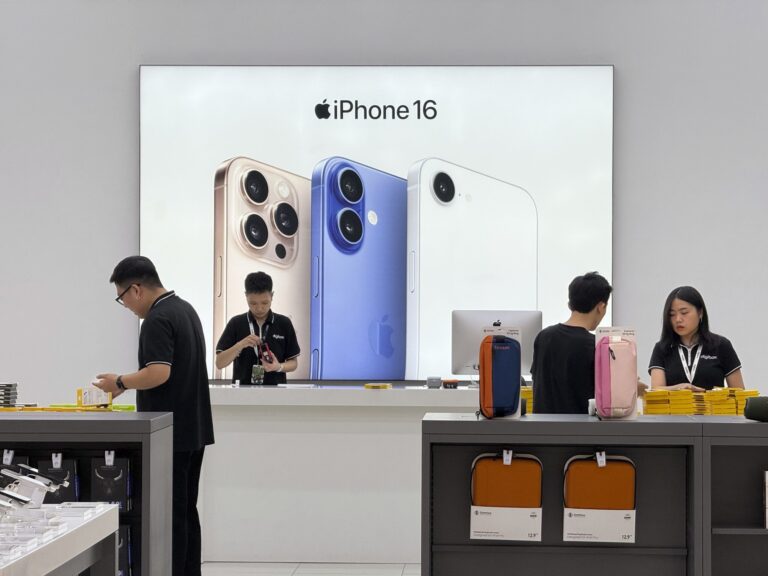China Responds to Trump’s Tariff Exemption Decision: A Step Towards Trade Normalization
China’s Reaction to Recent TariffChanges
China has characterized President Trump’s recent decision to exempt certain consumer electronics from tariffs as a “small step” toward restoring normal trade relations between the two nations. The Ministry of Commerce emphasized the importance of moving beyond these exemptions and called for a complete reversal of the trade war initiated by the United States.
“This is a small step by the US toward correcting its wrongful action of unilateral ‘reciprocal tariffs,’” the Ministry stated on social media. They urged Trump to “take a big stride in completely abolishing the wrongful action,” advocating for resolution through mutually respectful dialogue.
Details of the Tariff Exemption
The Trump administration announced on Friday that items such as smartphones, laptops, and certain chips would be exempt from reciprocal tariffs. This decision aims to lower prices on essential consumer electronics, which typically aren’t manufactured in the U.S.
Key Points on Tariff Exemptions:
- Exempt Items: Smartphones, laptops, hard drives, flat-panel monitors, and some chips.
- Excluded Items: Machines for semiconductor manufacturing are still subject to applicable tariffs.
- Impact on Major Tech Firms: Companies like Apple, Samsung, and chip manufacturers such as Nvidia stand to benefit significantly.
This exemption is expected to boost tech stocks, particularly with a potential rally anticipated on Monday.
Challenges for Smaller Businesses
Despite the positive outlook for larger corporations, smaller U.S. businesses that lack political connections and rely on Chinese imports may struggle to receive similar relief. The benefits of tariff exemptions primarily favor established tech giants.
Trump’s Remarks on Trade Dynamics
While traveling on Air Force One, President Trump mentioned he would provide more specifics on tariff exemptions soon. He remarked that “we’ve been making a lot of money,” signaling his belief that other countries, especially China, have gained financially at the U.S.’s expense.
The Bigger Picture: Tariffs and Manufacturing Shifts
The recent exemption appears to signal a recognition that shifting manufacturing for consumer electronics back to the United States may not occur quickly, if at all. The notion that tariffs would compel Apple to manufacture iPhones domestically has been met with skepticism.
Experts contend that it would require years and substantial investment to establish new manufacturing facilities in the U.S., likely resulting in significantly higher product prices.
Market Reactions and Future Prospects
The announcement has already influenced stock prices in the tech industry, particularly affecting the “Magnificent Seven” tech stocks — Apple, Microsoft, Nvidia, Amazon, Tesla, Google’s parent company Alphabet, and Meta Platforms. The combined market value of these companies recently faced a downturn of approximately $2.1 trillion before showing signs of recovery as tariff discussions progress.
Summary of Market Impact:
- Initial loss: $2.1 trillion (14% decline)
- Current recovery after exemption: Down by $644 billion (4% decline)
Consumer Confidence and Price Stability
The electronics exemption aims to alleviate concerns that tariffs might trigger drastic price hikes on indispensable technology products. This strategy aligns with the expectations of industry leaders who hoped for favorable treatment under Trump’s administration.
Key Quotes from Industry Leaders
- Apple CEO Tim Cook, alongside other tech leaders, expressed hope for a more favorable business environment under Trump.
- Trump had previously praised Apple for its commitment to investing $500 billion and creating 20,000 jobs in the U.S.
Continued Pressure on U.S. Tech Manufacturing
Despite these exemptions, the White House maintains that it intends to encourage U.S. tech firms to relocate manufacturing operations back to America.
White House Press Secretary Karoline Leavitt stressed, “President Trump has made it clear America cannot rely on China to manufacture critical technologies such as semiconductors, chips, smartphones, and laptops.”
Conclusion: The Road Ahead in U.S.-China Trade Relations
As the situation develops, the latest tariff exemptions serve as a focal point in U.S.-China relations. The effectiveness of these changes remains to be seen, but the tech industry watches closely, hoping for further normalization of trade relations and sustained growth.
For ongoing updates on trade relations and their impact on the tech sector, visit Reuters or Bloomberg.


